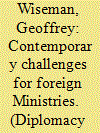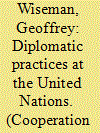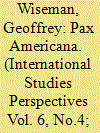| Srl | Item |
| 1 |
ID:
046413


|
|
|
|
|
| Publication |
Hampshire, Palgrave, 2002.
|
| Description |
ix, 293p.
|
| Series |
St Antony's series
|
| Standard Number |
0333790251
|
|
|
|
|
|
|
|
|
|
|
|
Copies: C:1/I:0,R:0,Q:0
Circulation
| Accession# | Call# | Current Location | Status | Policy | Location |
| 045360 | 355.03/WIS 045360 | Main | On Shelf | General | |
|
|
|
|
| 2 |
ID:
170930


|
|
|
|
|
| Summary/Abstract |
Whilst the diplomatic studies field has grown impressively in the past decade, paradoxically there is much still to be learnt about ‘state foreign services’, a term covering the two sides of the diplomacy coin: diplomats serving at home – in the Foreign Ministry – and abroad – at embassies and consulates. Diplomats have a Janus-faced view of their profession: as envoys abroad and bureaucrats at home. This analysis first assesses the American approach to diplomacy’s two sides, focusing on the impact of the Donald Trump presidency as a benchmark. Flowing from this are several key challenges that bedevil virtually all democratic foreign ministries: How to frame the ‘national interest’? How to represent blemished or populist leaders? How to deal with dissent? How to balance the field-headquarters nexus? And how to manage relations with non-state actors. So long as the Westphalian state system survives, so, too, will the two-sided foreign-service model. Only when moving away from diplomacy as ‘state practice’ to diplomacy as ‘social practice’ can the foreign-service model recede, with diplomacy becoming disintermediated, omnilateral, and post-Westphalian, potentially manifesting radically different practices.
|
|
|
|
|
|
|
|
|
|
|
|
|
|
|
|
| 3 |
ID:
141722


|
|
|
|
|
| Summary/Abstract |
This article considers the importance of informal, practice-based change as opposed to formal change at the UN. I first evaluate UN reform, showing that diplomacy and institutional change within the UN system are better understood as having evolved less from major, formal reform of the UN Charter (‘the Charter’) than from minor changes in routine practices. I then examine what practice theory and diplomatic studies can learn from each other in terms of how each views the role of leading individuals, illustrating specific practice-based change in relation to the Secretary-General’s role. Next, I show how the appointment process for a new Secretary-General has evolved through informal practice, after which I advance an argument that UN diplomatic practices should be considered not only within the narrow context of a formal diplomatic corps of member state diplomats but also as part of an informal, wider diplomatic community of diplomats and non-state actors. Practice theory helps students of diplomacy think more abstractly and systematically about mundane diplomatic practices. Students of diplomacy can help guide practice theory toward empirical diplomatic activities that are often internalized and taken for granted. I conclude that a dialog between the two fields will promote a better understanding of diplomacy as undervalued practices.
|
|
|
|
|
|
|
|
|
|
|
|
|
|
|
|
| 4 |
ID:
066347


|
|
|